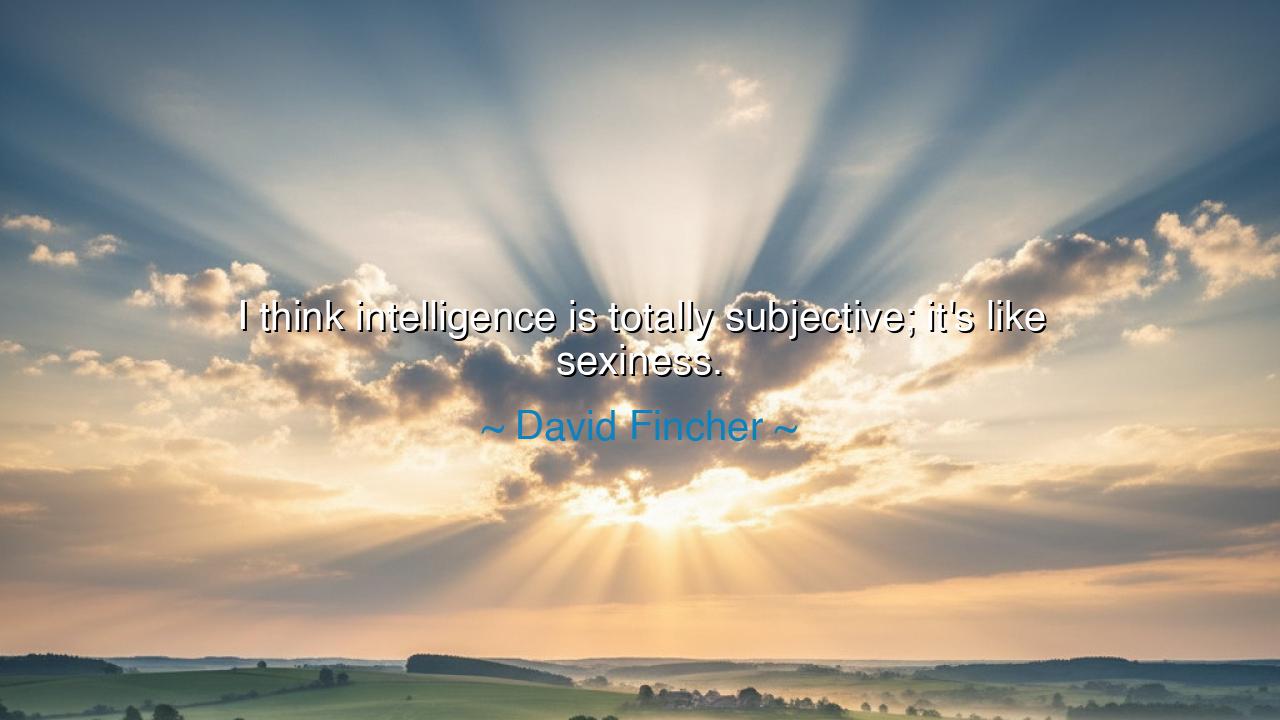
I think intelligence is totally subjective; it's like sexiness.






“I think intelligence is totally subjective; it’s like sexiness.” Thus spoke David Fincher, the master craftsman of cinema whose works explore the deepest corridors of the human psyche. In these few words, he offers not a jest, but a profound reflection on the nature of perception — how intelligence, like beauty or desire, lies in the eye of the beholder. What one person sees as genius, another may see as folly; what one calls cleverness, another might dismiss as arrogance. Fincher’s insight pierces through the illusion of universal standards, revealing that intelligence is not an absolute, but a mirror reflecting the values, desires, and biases of those who gaze into it.
To understand the origin of this thought, one must look at Fincher himself — a man of both vision and precision. His films, from Fight Club to The Social Network, dwell in the gray spaces between brilliance and madness. In his world, intelligence is never simple; it manifests as cunning, obsession, or innovation, depending on the angle of the light. When he says intelligence is “like sexiness,” he speaks as an artist who knows that attraction, whether intellectual or physical, is contextual and emotional. What makes one mind alluring to some may repel others. Thus, intelligence, like beauty, exists not in the subject but in the relationship between the subject and the observer.
The ancients too understood this duality. The philosopher Socrates, though condemned by his city for “corrupting the youth,” was later revered as one of the wisest of all men. His contemporaries saw insolence where later generations saw insight. Likewise, the mystics of the East spoke of the “wisdom of fools” — those who see truths that the world dismisses. What Fincher expresses in modern form is this eternal paradox: that intelligence is bound to perception, and perception is shaped by time, culture, and emotion. What is clever today may seem crude tomorrow; what is foolish in youth may prove prophetic in age.
Fincher’s comparison to sexiness adds another layer of meaning — for sex appeal, too, is a force of mystery, born of contrast and chemistry rather than measurable traits. There are no formulas for desire, no scales for beauty; what captivates one heart leaves another unmoved. So too with the mind. A mathematician’s brilliance may be invisible to a poet, and a poet’s genius may be dismissed by a scientist. Intelligence reveals itself differently to every eye — sometimes as logic, sometimes as intuition, sometimes as the courage to imagine what others cannot. In this way, Fincher reminds us that the subjectivity of intelligence is not a flaw, but a reflection of the vast diversity of human perception.
Consider Albert Einstein, whose teachers once declared him slow and unteachable. They could not see the storm of thought within him, for their measure of intelligence was confined to rote learning. Yet in time, his way of seeing — his “sexiness,” if you will, in the intellectual sense — transformed the world. Einstein himself later said, “Imagination is more important than knowledge.” In that, he echoed Fincher’s truth: that intelligence cannot be confined to rules or institutions, for its essence lies in the spark that moves others, not in conformity to a standard.
There is also a quiet warning within Fincher’s words. When we treat intelligence as objective — as a fixed currency — we risk arrogance and exclusion. We create hierarchies that reward one kind of thinking while silencing others. But when we accept its subjective nature, we make room for different kinds of brilliance — the logic of the engineer, the empathy of the artist, the intuition of the parent, the courage of the dreamer. True wisdom, Fincher suggests, lies not in defining intelligence, but in recognizing its many forms and learning to admire them as we would admire beauty: freely, generously, and with awe.
So, my children of thought and curiosity, take this lesson from David Fincher: judge less, perceive more. Do not measure minds by how closely they resemble your own, but by how brightly they illuminate the world. See intelligence as you see beauty — mysterious, diverse, and alive. Admire it wherever it appears, even in forms you do not understand. For in the end, the highest intelligence is not that which claims to know all things, but that which delights in the endless variety of minds that make up the human spirit.






AAdministratorAdministrator
Welcome, honored guests. Please leave a comment, we will respond soon